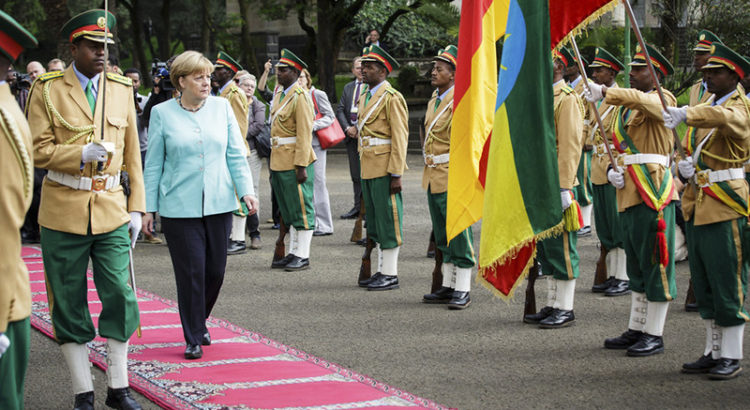Alemania/Enero de 2017/Autor: Nikolaj Nielsen/Fuente: Euobserver
RESUMEN: Alemania ha presentado un plan para África que tiene como objetivo aumentar el comercio y el desarrollo como parte de un esfuerzo mayor para frenar los flujos migratorios hacia Europa. Un proyecto de 33 páginas, presentado el miércoles (18 de enero) en Berlín por el ministro alemán de desarrollo, Gerd Muller, abarca áreas desde la energía hasta la evasión fiscal y el acceso a los mercados. Muller dijo en su sitio web que era necesaria una «nueva dimensión de la cooperación con África» y que Alemania estaba dispuesta a apoyar a los gobiernos de África en el esfuerzo. «Cualquier persona que lucha contra la corrupción, construye sistemas tributarios, invierte en educación y depende de la igualdad de género puede esperar más apoyo de nosotros», dijo.
Germany has unveiled a plan for Africa that aims to increase trade and development as part of a larger effort to curb migrant flows to Europe.
A 33-page blueprint, presented on Wednesday (18 January) in Berlin by Germany’s development minister Gerd Muller, covers areas from energy to tax evasion and market access.
Muller said on his website that a «whole new dimension of cooperation with Africa» was needed and that Germany was ready to support governments in Africa in the endeavour.
«Anyone who fights corruption, builds tax systems, invests in education and relies on gender equality can expect more support from us,» he said.
He said fast-growing economies in Africa presented a host of opportunities for German businesses.
German media report development funds will increase by another 20 percent for countries that undertake the reforms.
Dubbed the Marshall Plan, in reference to US aid to Western Europe following WWII, the proposal is likely to become a major feature of Germany’s G20 presidency this year.
But critics say the blueprint fails to explain how the plan would be tailored to the 54 separate countries on the African continent.
Unfortunately the Marshall plan remains unspecific on how the concrete measures and instruments will look like,» Christoph Kannengiesser, managing director of the Afrika Verein, told Deutsche Welle news website.
The EU launched similar schemes known as migration compacts last summer with Mali, Nigeria, Niger, Senegal, and Ethiopia, as part of its new «migration partnership framework».
The EU’s effort also aims to slow irregular migrant flows into Europe by looking at the political, social, and economic dimensions of development.
But a progress report issued in December noted major hurdles in terms of linking the compacts with policies on legal migration, trade, energy, agriculture, and education.
Last September, the European Commission had also announced an investment plan for Africa and is hoping to shore up some €88 billion from EU states.
The flurry of recent EU plans can be traced back to the Valletta summit on migration in late 2015. The summit was called in reaction to a large inflow of migrants seeking refuge in the EU.
African heads of governments and states gathered at the event, alongside their European counterparts.
The two sides issued a joint statement on deepening cooperation but differences on readmission of rejected migrants and creating more legal channels for migrants to arrive in Europe remain entrenched. The EU commission had also launched a €1.8 billion trust fund to support the measures.
A follow-up of what has evolved from the 2015 Valletta migration summit is set for early February in Malta.
Fuente: https://euobserver.com/migration/136600






 Users Today : 65
Users Today : 65 Total Users : 35459531
Total Users : 35459531 Views Today : 94
Views Today : 94 Total views : 3417852
Total views : 3417852